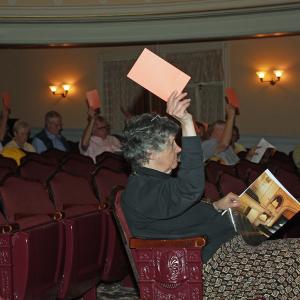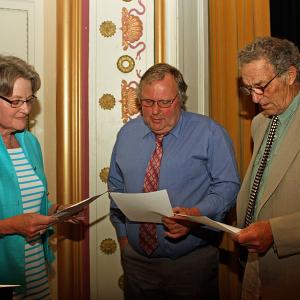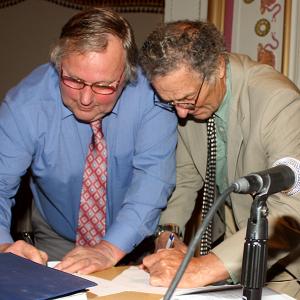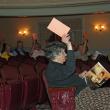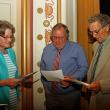Camden voters pass $7.1 million budget; Lookner, French sworn in
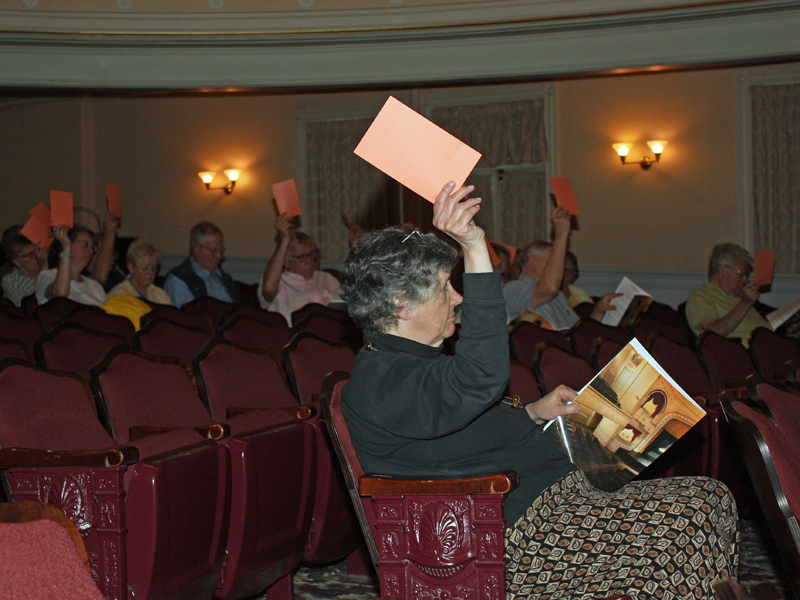 Camden voters raise their cards during the 2015 Town Meeting in the Camden Opera House June 10. (Photo by Holly S. Edwards)
Camden voters raise their cards during the 2015 Town Meeting in the Camden Opera House June 10. (Photo by Holly S. Edwards)
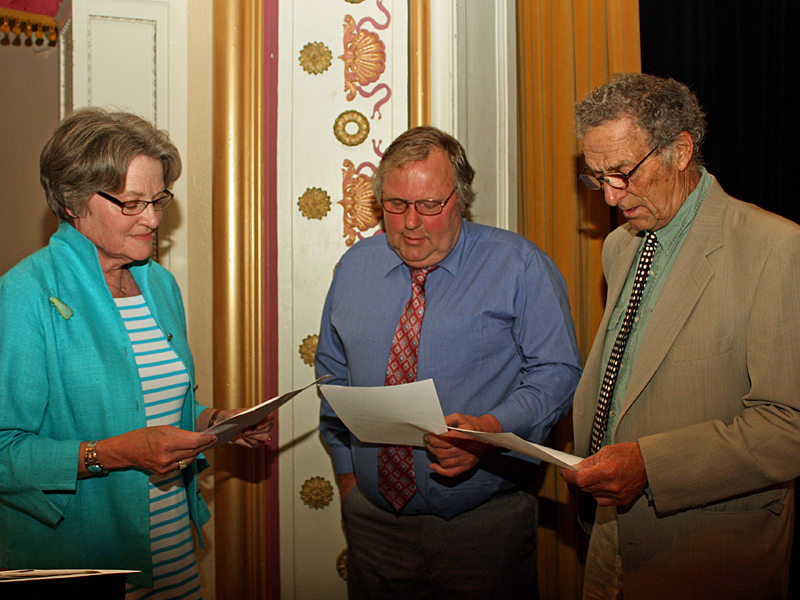 From left, June 2015 Town Meeting Moderator Deborah Dodge, John French and Leonard Lookner read and recite the oath of office as the two men are sworn back onto the Select Board, after having won election by popular vote June 9. (Photo by Holly S. Edwards)
From left, June 2015 Town Meeting Moderator Deborah Dodge, John French and Leonard Lookner read and recite the oath of office as the two men are sworn back onto the Select Board, after having won election by popular vote June 9. (Photo by Holly S. Edwards)
 From left, John French and Leonard Lookner sign paperwork that officially puts them on the Camden Select Board for another three years. Both incumbents, French won back his seat with 356 votes and Lookner with 314. French was also selected by fellow board members to serve as chairman for the next year. (Photo by Holly S. Edwards)
From left, John French and Leonard Lookner sign paperwork that officially puts them on the Camden Select Board for another three years. Both incumbents, French won back his seat with 356 votes and Lookner with 314. French was also selected by fellow board members to serve as chairman for the next year. (Photo by Holly S. Edwards)
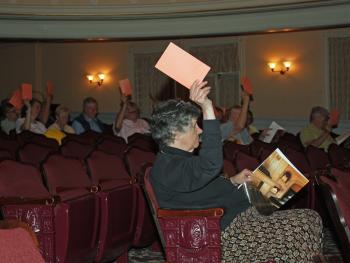 Camden voters raise their cards during the 2015 Town Meeting in the Camden Opera House June 10. (Photo by Holly S. Edwards)
Camden voters raise their cards during the 2015 Town Meeting in the Camden Opera House June 10. (Photo by Holly S. Edwards)
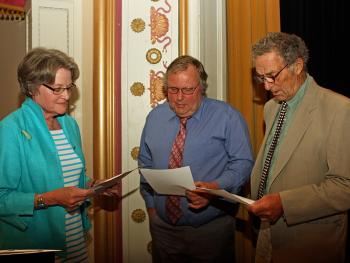 From left, June 2015 Town Meeting Moderator Deborah Dodge, John French and Leonard Lookner read and recite the oath of office as the two men are sworn back onto the Select Board, after having won election by popular vote June 9. (Photo by Holly S. Edwards)
From left, June 2015 Town Meeting Moderator Deborah Dodge, John French and Leonard Lookner read and recite the oath of office as the two men are sworn back onto the Select Board, after having won election by popular vote June 9. (Photo by Holly S. Edwards)
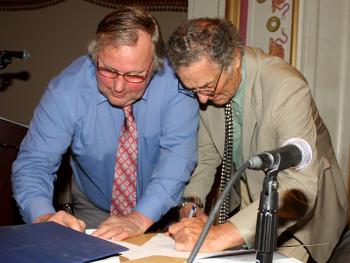 From left, John French and Leonard Lookner sign paperwork that officially puts them on the Camden Select Board for another three years. Both incumbents, French won back his seat with 356 votes and Lookner with 314. French was also selected by fellow board members to serve as chairman for the next year. (Photo by Holly S. Edwards)
From left, John French and Leonard Lookner sign paperwork that officially puts them on the Camden Select Board for another three years. Both incumbents, French won back his seat with 356 votes and Lookner with 314. French was also selected by fellow board members to serve as chairman for the next year. (Photo by Holly S. Edwards)
CAMDEN — Less than 70 of Camden’s approximately 3,800 registered voters turned out for the annual June Town Meeting in the Opera House Wednesday night, to complete the work of passing what ended up being the town's $7,151,110 budget for 2015-2016.
There was a move to reduce the General Government budget by $70,879, an amendment motion made by Camden resident Steve Melchiskey, but that motion ultimately failed by a show of hands.
Deborah Dodge served as moderator for the town meeting, and the first order of business was to read the official tallies for the secret ballot voting portion of the town meeting, which took place at the polls June 9. According to Town Clerk Katrina Oakes, 684 voters turned out to the polls Tuesday, a 17-percent turnout.
For Select Board, John French garnered the most votes following by Leonard Lookner. Both men were seeking to retain their seats on the board for another three years. French won with 356 votes and Lookner with 314.
Lynda Chilton, running unopposed for one three-year term on the Maine School Administrative District 28/CSD 19 Board of Directors, received 491 votes.
There were 36 write-in votes for one three-year seat on the Personnel Board, and Steve Melshiskey won with eight votes.
Article 3, an amendment to the Camden Zoning Ordinance to add a new overlay to five districts passed, 392 to 212.
Articles 4 and 5, which were amendments to the Zoning Ordinance to eliminate the ability to apply for low impact uses within 500-feet of a business or industrial district in the Traditional Village District (V) and Village Extension District (VE) respectively, both failed at the polls. Article 4 received 303 in favor and 312 against, and Article 5 received 290 in favor and 321 against.
Camden voters approved both school budgets, voting 529 to 132 in favor of the Five Town CSD budget and 534 to 133 in favor of the SAD 28 budget.
Article 6, which moved to set Nov. 15 and May 15 as due dates for taxes and to fix the rate of interest and unpaid taxes at 7 percent per year, passed, as did Article 7, which moved to authorize the Select Board and Treasurer, on behalf of the town, to apply for and accept grants, gifts, real estate and other funds given or left to the town.
Article 8, which for many years has appeared on the Annual Meeting ballot and seeks to authorize the Select Board to dispose of tax acquired property "in any manner" the Select Board deems in the best interest of the town, passed without the objection of Leonard Lookner. In the past, Lookner has opposed the Article both as a private citizen, and later as a member of the Select Board.
Wednesday night, Lookner acknowledged his change of opinion without explanation, and voted with the majority in favor of Article 8.
Article 9, which authorizes the Select Board to dispose of personal property, and Article 10, which authorizes the Select Board to transfer amounts not to exceed 10 percent of unexpended balances from any budgetary category to another (following a public hearing), also both passed.
The final article, before seven lines of the budget were voted on individually and wholly, was Article 11, which was a vote to appropriate $1,910,150 from non-property tax revenue sources to be used in reducing the property tax commitment for the expenditures in Article 12 for the 2015-2016 fiscal year, also passed.
As voters moved to the actual budget, which would be appropriated and raised, net of non-property tax revenues, for the coming year, the first item took the longest to decide.
The Budget Committee had recommended a General Government budget of $1,681,048 and the Select Board recommended $1,684,689. That difference of $3,641 was due to a timing issue between when the Budget Committee voted on the budget and when the Select Board had it to vote on, and it had to do with money that was no longer federally funded to support economic development, according to Town Manager Patricia Finnigan.
That then prompted a discussion by voters and town officials about the need for an economic development director, which the town is calling a community development director in the upcoming budget.
Resident Parker Laite asked Finnigan what the person in that position will do that the local chamber of commerce won't do for the town. He also said that the town of Camden had less population than it did 15 or 20 years ago, and wondered how it got to where it is without an economic development director.
"We are members of the chamber [Penobscot Bay Regional Chamber] but they don't serve the community the way a development director would," said Finnigan.
She also said that the community has been very fortunate in that it has many people volunteer their time over the years, and that they have worked very hard to get businesses into the community and help them grow.
"And we still rely on that, and we have a very active economic development committee, but those are volunteers, and the reality of life in 2015 is that volunteers can do a whole lot but they can't do 40 hours a week, doing the things that we need to do to be able to expand our tax base. And frankly, when you look at our non-property tax revenues, we have got to do something if we are going to be able to grow this community. We need to be able to expand our demographics, and that is the kind of work a community development director will work with us on," said FInnigan. "But I don't want anyone thinking it won't take people in this community to work with us to make this happen."
Melchiskey stepped up next and made the motion to amend the budget line to reduce it by $70,879, which was the amount of salary slated for the future community development director. If approved, that would make the General Government budget total $1,613,810.
Melchiskey said he served on the budget committee and that the development director position was the most contentious issue. In the end, he said the committee voted 13 to 7 in favor of leaving the money in the budget.
"Back in 2010, the planning and development line was $22,000 and today it is $270,044. That line has increased 10-fold, and while I realize there are other things rolled into that $270,044, the economic development director is a big part of that," said Melchiskey. "While we had one [economic development director], we spent $400,000 and there are many needs in this community to spend on like we have. And during the budget committee meetings, I said, name me one job created, one job saved and nobody said anything."
Select Board member John French spoke next and responded to Melchiskey's comments, saying that one job the former economic development director did was to bring the company to town that took over Tibbetts Industries, saving 30 jobs.
"He got us a lot of grants, and he helped a lot of businesses," said French. "He changed my mind and I support the position."
Lookner then said that the former economic development director was hired to develop the tannery property. He said there was a general economic malaise in the community at the time, and he disagreed with French about how relevant the former position holder had been in the Tibbetts change of hands.
"We can talk about grants acquired, but whether there was enough to balance his salary is unknown," said Lookner. "I felt that with the grants he did get, most of the money we spent was on advisers, consultants and planners so there was hardly any money left over."
Lookner said, "We said no to the school, to the new middle school, because we thought we couldn't afford it, and I think we can say no to the economic development director because it's more money than we should put forward. I am going to vote against it. I'm going to vote in favor of Steve's amendment."
Resident Paul Cavalli stepped up to microphone and said he wasn't going to talk about the importance of the position or the need, but did have a concern about the focus of the current discussion.
"The thing I find a little disturbing, is I feel like we are talking about the person who had the job, more than we are talking about the job. The person who had the job is gone. And the job we are talking about could, would be I'm sure by the process the town is going through, would be somebody who could put all these things that people are saying didn't happen, correctly," said Cavalli. "We seem to be talking about what didn't happen with one person, and in a situation where you fill jobs, it's more about what you are expecting of the person coming into it."
Resident Geoff Scott told the assemblage that the former economic development director "helped a lot" with the various town groups he worked on, and that the purpose of the person/position is to move the town forward.
"The Chamber isn't here anymore and they aren't here advocating for us anymore. It's not that they ever sought active grants for us either," said Scott.
Select Board member Don White said he was in favor of the position. He said that the title had been changed to a community development director and that the salary is less than before too.'
"I support this," said White.
Also speaking in favor of the position and funding it in the 2015-2016 budget were Meg Quijano, owner of The Smiling Cow, Robin McIntosh, chairman of the Community & Economic Development Advisory Committee, resident Marc Ratner, who also ran against Lookner and French for Select Board this term, and resident Anita Brosius-Scott.
By a vote of 35 to 19, Melchiskey's amendment motion failed. On the Select Board, Lookner and Jim Heard voted in favor of the amendment.
By a vote of 39 to 15, the original motion carried, with Lookner and Heard voting against it.
The remainder of the budget items passed without amendments, with all of the Select Board recommended totals being approved. The final budget that was approved was $7,151,110. The Town Meeting adjourned around 8:30 p.m.
Reach Editorial Director Holly S. Edwards at hollyedwards@penbaypilot.com and 706-6655.
Event Date
Address
United States

